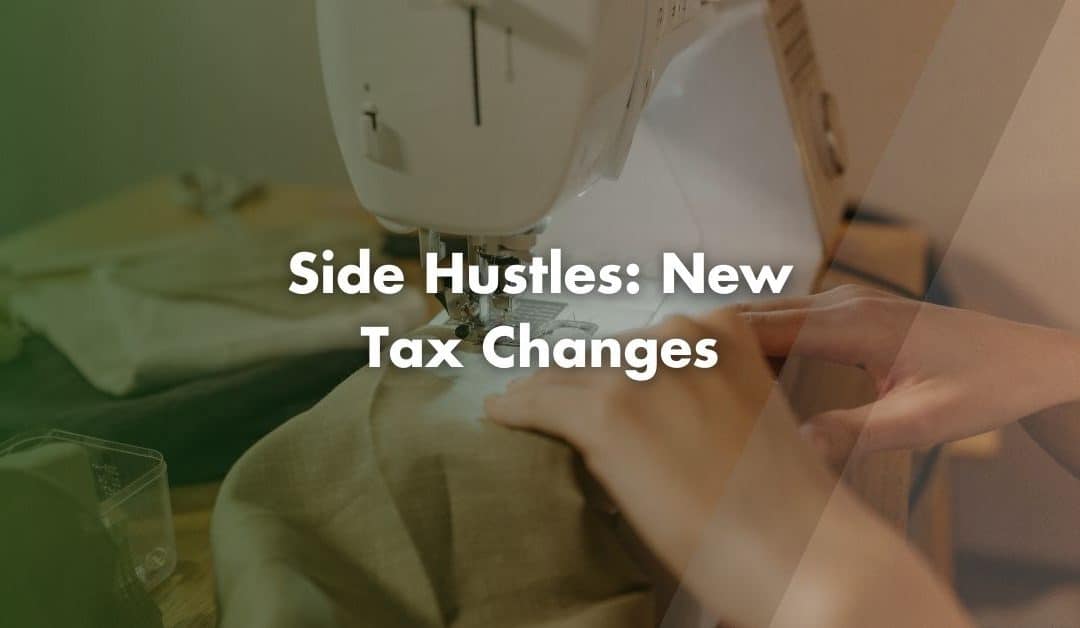The gig economy continues to thrive, with more people turning to side hustles to supplement their income or monetise a hobby. However, the new tax rules introduced in 2024 mean that anyone earning from a side hustle needs to be aware of their tax obligations.
What are Side Hustles?
A side hustle is any activity that generates extra income outside of a full-time job. It can include:
- Selling handmade craft or second-hand items online
- Freelance work such as writing, graphic design or photography
- Renting out a spare room or driveway
- Reselling items bought at a discount
While side hustles can be a great income boost, many people are unaware of the tax implications. The new tax changes now make it easier for HMRC to track side hustle earnings. You need to know when and how to pay tax on additional income.
The New Tax Rules Explained
1. Digital Platforms Reporting Earnings
From 1st January 2024, platforms such as eBay, Vinted and Airbnb must report user earnings to HMRC. If you are selling goods or services online, your income may now be automatically visible to tax authorities. This change closes tax loopholes and reveals true online earnings.
2. The £1,000 Trading Allowance
If you earn less than £1,000 per year from your side hustle, you do not need to report it to HMRC. However, if your income exceeds this threshold, you must register for Self Assessment and complete a tax return. This allowance applies to all your side hustles combined, meaning you do not get separate allowances for multiple ventures.
3. Self-Employment Registration
Once your earnings exceed £1,000, you must
- Register as self-employed with HMRC
- File an annual tax return
- Keep records of all income and expenses
You need to register in this case, as failure to report taxable income can result in penalties. The Self Assessment system also requires you to calculate and pay your own tax.
4. National Insurance Contribution Changes
From 6th April 2024, HMRC will remove Class 2 National Insurance Contributions (NICs) for self-employed workers. This change aims to reduce costs for those earning additional income through self-employment. Additionally, changes to Class 4 NICs will lower the overall tax burden for many.
When Does a Hobby Become a Taxable Business?
A common question is when a hobby turns into a business. If you sell goods or services with the intention of making a profit, HMRC will likely classify it as self-employment. This means you must report and pay tax on your earnings.
The key factor is whether you engage in the activity regularly and aim to make a profit. Occasionally selling personal items does not incur tax, but regularly buying stock to resell qualifies as a business activity.
How to Register Your Side Hustle
If your side hustle qualifies as a business, you must register with HMRC. The process involves:
1. Choosing a business structure – Most side hustles operate as sole traders, which is simple and requires minimal setup. However, forming a limited company offers financial protection but comes with additional administrative responsibilities.
2. Informing HMRC – You can register as self-employed online at GOV.UK. HMRC will issue a Unique Taxpayer Reference (UTR) number within 10 days.
3. Filing a Self Assessment tax return – Each year self-employed individuals must report their income and expenses to HMRC.
4. Setting up a Government Gateway Account – This account allows online tax submissions and helps you track liabilities.
How to Stay Compliant
1. Track Your Income and Expenses
You should keep detailed records of all transactions, while also tracking:
- Sales and payment received
- Business-related expenses (materials, tools, marketing, etc)
- Receipts and invoices
2. Meet the Deadlines
If you miss a tax deadline, HMRC will penalise you. You should remember the following dates:
- 5th October is the deadline for registering for Self Assessment if you have never filed a tax return before
- 31st October is the deadline for submitting a paper tax return
- 31st January is the deadline for online tax return submissions and payments
3. Consider Opening a Separate Business Bank Account
Using a separate bank account for your side hustle helps track earnings and simplifies tax reporting. Many banks offers free business accounts tailored for self-employed workers.
4. Claim Allowable Expenses
You may be able to reduce your taxable income by claiming expenses such as:
- Office supplies
- Travel costs
- Marketing and advertising expenses
If your allowable expenses exceed £1,000, it may be more beneficial to deduct these instead of claiming the Trading Allowance.
What Happens if You Don’t Pay Tax?
Failing to report taxable side hustle income can lead to serious consequences, such as:
- HMRC can issue late payment penalties, starting at £100 for missing the tax return deadline
- Any unpaid tax accumulates interest over time
- HMRC can use enforcement agents to recover unpaid taxes
- In extreme cases, tax evasion can lead to prosecution
Can You Claim Tax Back?
Running a side hustle often comes with costs, but you may be able to claim tax relief on business expenses. HMRC allows deductions for items such as:
- Business equipment (laptops, tools, software, etc
- Marketing and advertising expenses
- Business-related travel costs
You must only claim allowable expenses, as claiming incorrectly can lead to audits and penalties.
Contact Us
We are not just accountants; we are Chartered Accountants with one of the most reputable and premium accounting bodies. We are registered and regulated by ACCA; so you can rest assured that you are in good hands. Knowing this, don’t hesitate to get in touch with us if you require assistance: Pi Accountancy | Contact Us

